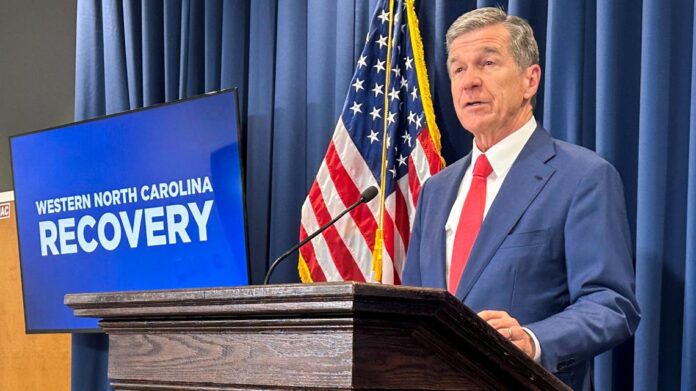Cooper criticized the General Assembly’s recent recovery bill, describing it as a “power grab” that fails to provide immediate funding to small businesses.
CHARLOTTE, N.C. — Gov. Roy Cooper is ramping up efforts to secure the “substantial” federal funding required to rebuild western North Carolina after Hurricane Helene, the deadliest and most expensive storm in state history.
In an interview with WCNC Charlotte, Cooper revealed the storm’s catastrophic impact of $53 billion. Helene was blamed for 103 deaths statewide. Cooper said he is seeking $25.5 billion in federal aid to rebuild critical infrastructure, including roads and bridges that were washed out, as well as public water systems that were knocked offline for weeks. During the interview, Cooper emphasized the need to build stronger, more resilient infrastructure ahead of future storms.
“These roads and bridges, and water systems and housing are going to have to be built back even stronger. That’s going to be more expensive,” Cooper said. “But we believe the investment is western North Carolina is worth it.”
Cooper said he’s met with President Joe Biden and numerous federal agencies and provided information to President-elect Donald Trump’s team about the urgent need for relief in the mountains. He stressed that local governments cannot shoulder the load alone and called for a bipartisan approach to helping the region recover.
“We’re hoping that they will make this a priority,” Cooper said. “It’s too important not to do this.”
Cooper credited Sen. Thom Tillis, a Republican who has pushed multiple bills for immediate Helene relief in devastated regions.
“We have a split congressional delegation, they’re all united in their support for this,” Cooper said. “I think that there’s a good shot at getting a substantial chunk of this money. We need this federal funding, the local governments can’t do it by themselves, that’s for sure.”
At the state level, the Republican-controlled General Assembly passed a bill this week that contained $227 million in relief from the state’s reserves but ordered the money to remain unspent for now. The bill did give Cooper’s office an additional $50 million to address a shortfall to complete housing projects from Hurricane Matthew in 2016 and Hurricane Florence in 2018. The bill also included provisions that would weaken the powers of the incoming governor, attorney general and state superintendent, all Democrats, and shifted election board appointments to the Republican state auditor.
“This bill really didn’t provide immediate and direct funding to western North Carolina,” Cooper said. “It simply moved some money around, saying that they were going to appropriate it later, that leaves small businesses hanging that are really in need of direct grants. It leaves local governments hanging and to bill this as a disaster recovery legislation, it’s really a disaster in and of itself because it’s just a massive power grab.”
